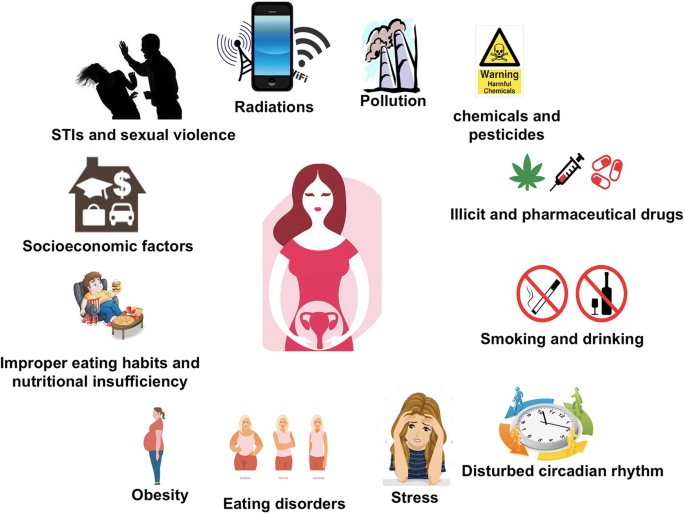Taking Charge of Your Fertility 101: Making Efficient & Informed Decisions
As someone who is trying to conceive, understanding the secrets of taking charge of your fertility can greatly increase your chances of success. Age, general health, reproductive health, and frequency of sex are all factors that can impact fertility.
While most couples are able to get pregnant within a year of regular intercourse without contraception, fertility issues can arise due to a variety of disorders such as ovulation failure and sperm disorders.
In this article, I will explore the factors that affect and taking charge of your fertility and the common causes of infertility. By understanding these key points, you will be better equipped to seek help if needed and increase your chances of conceiving.

Whether you are just starting to try or have been struggling for some time, unlocking the secrets of taking charge of your fertility is essential for achieving your dream of starting or growing your family. So, let’s dive in and discover what you need to know about fertility.
Key Takeaways
– Fertility is affected by various factors including age, general and reproductive health, frequency of sex, and lifestyle factors such as obesity, anorexia nervosa, excessive exercise, smoking, and alcohol consumption.
– Common causes of infertility in women include ovulation failure due to hormonal imbalances, thyroid disorders, and polycystic ovary syndrome, while sperm disorders in men can be caused by genetic factors, infections, and lifestyle choices.
– Medical interventions such as fertility drugs, intrauterine insemination, and in vitro fertilization can help couples struggling with infertility, and seeking help early can increase the likelihood of a successful pregnancy.
– It’s important to acknowledge the emotional impact of infertility and seek support and coping strategies such as mindfulness and exploring alternative options.
Taking Charge Of Your Fertility (Factors Affecting)
As I read about pre-existing knowledge, I learn that age, general health, reproductive health, and frequency of sex can affect chances of conceiving and increase egg quality. Now I’m interested to know more about these factors affecting fertility.
Age plays a significant role in taking charge of your fertility, and women become less fertile as they age. The quality and quantity of eggs decrease, and the risk of pregnancy complications increases. Men also experience a decline in fertility, but it usually occurs later in life compared to women.

General health, including physical and mental health, also affects while taking charge of your fertility. Obesity, anorexia nervosa, and excessive exercise can cause fertility problems. Mental health conditions, such as anxiety and depression, can also affect fertility.
Additionally, infections, blocked fallopian tubes, endometriosis, and low sperm count can cause fertility problems. It’s essential to maintain a healthy lifestyle and seek medical advice if experiencing any of these issues. Regular check-ups and treatments can help increase the chances of conceiving.
Common Causes of Infertility
One of the most common causes of infertility is ovulation failure and sperm disorders. Ovulation failure can occur due to hormonal imbalances, thyroid disorders, or polycystic ovary syndrome.
Sperm disorders, on the other hand, can be caused by genetic factors, infections, or lifestyle choices such as smoking and excessive alcohol consumption.
If you’re struggling to conceive, it’s important to seek medical advice to determine the cause of infertility. In some cases, lifestyle changes such as quitting smoking or reducing alcohol intake can improve fertility.
In other cases, medical interventions such as fertility drugs, intrauterine insemination, or in vitro fertilization may be necessary. It’s also important to note that infertility affects both men and women, and seeking help early can increase the likelihood of a successful pregnancy.
Seeking Help for Fertility Issues
I should seek medical advice if I am struggling to conceive, as early intervention can increase the chances of a successful pregnancy. A general practitioner (GP) can provide initial advice and tests, but if necessary, they will refer me to a fertility specialist. The National Institute for Health and Care Excellence (NICE) guidelines provide a framework for assessment and treatment for people with fertility problems. The guidelines recommend that couples try to conceive for one year before seeking help, but if the woman is over 36 or there are known fertility problems, seeking help after six months is advisable.

The decision to seek help for taking charge of your fertility issues can be emotionally challenging. The following table provides a visual representation of the emotional impact of infertility and seeking medical help. It is essential to acknowledge and address the emotional impact of fertility issues, as it can affect mental health, relationships, and overall well-being.
| Emotion | Description | Coping Strategy |
|---|---|---|
| ———- | ———— | ————— |
| Anxiety | Feeling worried and stressed about fertility issues. | Mindfulness, meditation, and talking to a therapist. |
| Guilt | Blaming oneself or a partner for infertility. | Acknowledging that infertility is not anyone’s fault and seeking support from loved ones. |
| Hopelessness | Feeling that pregnancy is impossible. | Seeking medical help, exploring alternative options, and connecting with others who have experienced infertility. |
Frequently Asked Questions
How does stress affect fertility?
Stress can affect while taking charge of your fertility by disrupting hormone levels, menstrual cycles, and ovulation. Chronic stress may lead to reduced sperm and egg quality, and increased risk of miscarriage. Managing stress through relaxation techniques may improve fertility outcomes.
Can certain medications affect fertility?
Certain medications can affect while taking charge of your fertility. For example, chemotherapy drugs, antidepressants, and antipsychotics can reduce fertility in both men and women. It’s important to discuss the potential effects of medications with a healthcare provider before trying to conceive.
Are there any natural remedies or supplements that can improve fertility?
There is limited evidence to support the use of natural remedies or supplements to improve taking charge of your fertility. Some studies suggest that certain supplements, such as folic acid and coenzyme Q10, may help, but more research is needed. It’s important to talk to a doctor before taking any supplements.
How long should a couple wait before seeking fertility treatments?
If trying to conceive for 1 year without success, seek advice from a GP. Fertility treatments can be considered after 2 years or if there are underlying health conditions. Early intervention can increase chances of success.
Can a history of sexually transmitted infections affect fertility?
Yes, a history of sexually transmitted infections (STIs) can affect taking charge of your fertility. STIs can cause damage to the reproductive system, leading to infertility. It is important to practice safe sex and seek treatment for STIs to prevent long-term consequences.







